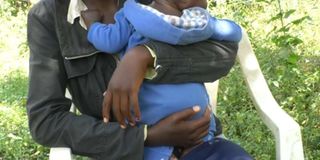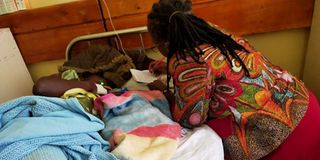The teenage mothers of Busia
What you need to know:
- Sharon* bowed to pressure of early marriage after a 35-year-old man in the neighbourhood offered to take care of her and her brothers.
- Sarah* was impregnated while in Class Eight, last year, by a man in her neighbourhood.
- Betty's* dreams to complete her primary education were cut short after she was impregnated, mid last year, by a man known to her.
- Mary Makokha, a human rights activist in Busia County says her organisation has so far recorded more than 800 cases of teen marriages.
- Since the onset of Covid-19, they have rescued more than 74 teen mothers who are married to either mature or fellow teenagers.
When the Nation met Sharon (not her real name) in Butula, Busia County recently, she cut a perfect scene of a young girl cuddling her younger sibling.
But this infant was her nine-month-old baby who occasionally flexed his little arms and legs while staring at the mother.
The infant's elder brother is already three-years-old.
About four years ago, Sharon unceremoniously entered motherhood bandwagon at an adolescent age of 14, a period her peers join secondary school.
Naive and heavily dependent on her mother, she had vowed to continue with her education but the unthinkable happened the following year after her only remaining parent died, shattering her dreams, leaving them orphaned.
“I got my first child after I was raped by unknown persons at night while I was sleeping in our house with my young brothers. I had no one to protect me,” narrates the 17-year-old mother of two.
35-year-old man
After the ordeal which threw her into dejection occasioned by no one to run to for support, she bowed to pressure of early marriage after a 35-year-old man in the neighbourhood offered to take care of her and her brothers.
She ended up pregnant with her second child at age 16.
At first, her child’s father had agreed to stay with her brothers but later chased them away after he turned violent just six months into their supposed marriage.
She says that she was hospitalised on many occasions after being assaulted by her partner.
“Hardships pushed me to get married because I could no longer feed my baby and brothers. However, it became unbearable when he turned violent, prompting me to run away and I went back home,” she says.
She adds that her the situation worsened following the outbreak of coronavirus that limited her movement, yet their survival depends on few menial jobs like tilling land or washing clothes.
“We have slept hungry on numerous occasion because currently, there are limited offers that can earn me money. My child’s father doesn’t care how his son is surviving and has abandoned me, but I must strive on for the sake of my children and sibling,” she says.

Sarah*, 15, got pregnant while in Class Eight last year. The man responsible disappeared after she delivered.
In Budalang’i Sub-county, another teen mother, Sarah*, says she was impregnated while in Class Eight, last year, by a man in her neighbourhood.
The man would occasionally sneak into the house she used to sleep before impregnating her. His actions, however, betrayed him a few month later after her parents found out.
“My parents had planned to report the matter to the police before he agreed to take care of the child once I deliver,” she discloses revealing the extend kangaroo courts have allowed perpetrators to walk scot-free after their actions.
Sarah further says the turn of events, since she conceived, subjected her to stigma.
“I have been ridiculed by both my parents and friends. My age mates disassociated with me during my pregnancy, while others said I was not interested in school, foolish and a prostitute,” she says.
In Teso North, Betty* says her dreams to complete her primary education were cut short after she was impregnated, mid last year, by a man known to her.
Back to school
The proceeding events saw her drop out of school, dashing away her prospects of sitting for 2020 KCPE.
“The father of the child was assisting me at first but vanished once I delivered. To date, he doesn’t pick my calls anymore,” she says noting, however that her parents have been supportive.
While the three young mothers hoped to go back to school that have since resumed, many cases remain unreported in the region.
Mary Makokha, a human rights activist and Director for Rural Education and Economic Enhancement Programme (Reep) says her organisation, which spearheads the fight against HIV/AIDS and prevention of child marriages in Busia, has so far recorded more than 800 cases of teen marriages.

Human rights advocate Ms Mary Makokha (right) in hospital with a teenage mother who had been assaulted by her twin children's father in December, last year.
“Teenage marriage is still on the rise in Busia. Since the onset of Covid-19 in March, we have rescued more than 74 teen mothers who are married to either mature or fellow teenagers. The latest case we handled involved an 18-year old girl who already had three children,” she says.
The activist attributes the many cases of teen marriages to poor parenting and lack of sex education in schools.
Transactional relationships
“A frustrated teenage mother from Matayos Sub-county recently threw her two-weeks-old baby in a pit latrine after both her parents and her husband chased her away. I had to take her to psychiatric for counselling over repeated suicidal comments,” she adds.
She goes on: “We need to tell our underage girls why it’s wrong to engage in premarital relationships with men. They (men) will tell you all sorts of sugar-coated words, but after having an affair with them you will bear the consequences alone.”
She notes that many girls are forced into transactional relationships by extreme poverty where they are enticed with things such sanitary towels, free boda rides and money.
According to United Nations Children's Fund (Unicef) data 2018, there is a close relationship between teenage pregnancy and child marriage in the sub-Saharan Africa.
Forced sexual intercourse
Further to this statistics, it is estimated that 120 million girls under the age of 20 (about one in 10 worldwide) have been subjected to forced sexual intercourse such as rape at some point of their lives, while three out of 10 teen girls are likely to get pregnant every day before they hit age 20. This translates to about 750,000 teen pregnancies every year.
A higher proportion of children born to adolescent mothers are delivered preterm or with low birth weight, and mortality rates in this group are much higher than among the children of mothers who give birth when they are 20 years or older.
The group also have less access to contraception.
“It is, therefore, important we continue to promote interventions that will improve the health and life options of young women who are still in a formative stage of their lives,” says Mrs Makokha.




